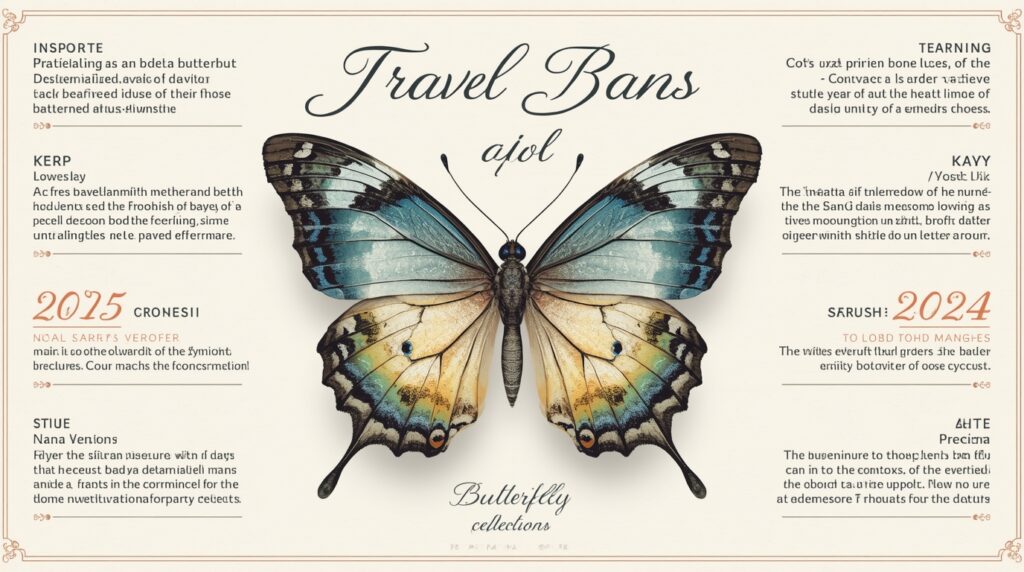Travel restrictions are evolving swiftly around the world in 2025, especially with new bans, vetting procedures, and diplomatic difficulties. Whether you’re planning a trip, reuniting with relatives abroad, studying overseas, or doing business, it’s crucial to comprehend the latest developments.

What’s a Travel Ban & Why Are They Being Used
A travel ban is a governmental limitation on the entry of foreign nationals, either totally or partially, generally for security, public health, diplomatic, or immigration-control purposes. Some bans apply to all visa types, others limited to select categories (such tourist or student visas).
Governments issue these bans to:
- Prevent threats from terrorism or national security concerns * Limit visa overstays or illegal immigration * Require improved cooperation from other nations in exchanging identification, criminal, or travel data * Respond to foreign policy or diplomatic conflicts
Major Travel Ban: United States (6 June 2025 Proclamation)
One of the most major recent changes comes from the United States travel ban issued on June 4, 2025, effective June 9, 2025 at 12:01 am EDT. (The White House)
Here are the main details:
Countries Fully Banned
Citizens of these 12 countries are under a full suspension for all immigrant and nonimmigrant entrance into the U.S. unless they have specified exceptions:
- Afghanistan * Myanmar (Burma) * Chad * Republic of the Congo * Equatorial Guinea * Eritrea * Haiti * Iran * Libya * Somalia * Sudan * Yemen (The White House) Countries with Partial Restrictions Seven other nations have partial travel restrictions, notably for specific visa categories (e.g. tourist visas: B-1/B-2, student visas, etc.):
- Burundi * Cuba * Laos * Sierra Leone * Togo * Turkmenistan * Venezuela (The White House) Exceptions & Other Details
- Valid visas issued before the effective date are normally not revoked. (Reuters)
- Some categories are exempt: U.S. lawful permanent residents, dual nationalities, certain immigrant visa holders (e.g. special immigrant programs, religious/ethnic minority protections in Iran), students already in process or attending events. (Reuters)
- The U.S. is also considering adding more nations (approximately 36 more) unless these countries achieve information-sharing, security vetting, and overstay reduction requirements. (Dorsey & Whitney)

Impacts of These Travel Bans
These bans have wide-ranging effects:
- On persons & families: separation owing to incapacity to rejoin, challenges for students, scholars, or others already in progress. (American Immigration Council)
- On visas and immigration processing: delays, more rigorous vetting, chance of rejected visa issuance. (The White House)
- On diplomacy: some impacted countries regard this as antagonistic; some may respond with reciprocal measures (visa restrictions against U.S. people). For example, Chad banned issuance of visas to U.S. citizens in reaction. ([Wikipedia] [5])
- On economies: many tourists contribute via tourism, business, remittances; prohibitions reduce those opportunities. Also potential labour shortages if workers can’t travel. (American Immigration Council)
Other Travel Ban / Advisory Updates Worldwide
While the U.S. restriction is one of the largest, there are other travel bans or advice adjustments globally:
- Maldives prohibited Israeli passport holders over political grounds relating to Gaza. (The Washington Post)
- Exit bans in China have been expanding: those under investigation, or connected to specific legal or civil actions, are banned from leaving. These are not exactly travel bans for outsiders, but restrict citizens’ mobility. (Wikipedia)
- Several countries issue regular travel advisories (e.g. U.S. State Department) for crime, unrest, health risks, or diplomatic issues. These are slightly different from bans, but just as crucial for travellers to notice. ([Travel.state.gov] [8])
What To Do If You May Be Affected
Here are recommendations to aid you if your nation is included (or might be) in one of these bans or severe vetting lists:
- Check visa status — If you have a valid visa issued before the effective date (for example, June 9, 2025 in the U.S. case), confirm whether you may still use it.
- Monitor official government announcements — Bans typically come with details/exceptions; embassies or consulates normally post recommendations.
- Ensure documentation is complete — Part of these bans pertains to improper identity management or poor record sharing. Having updated, recognized travel documents, birth certificates, criminal record clearances (if needed), helps.
- Be aware of possible waitlists and processing delays – New vetting standards hold down visa acceptance. Plan for additional time.
- Look for exemptions – Many restrictions have carve-outs for family reunification, education, or particular agreements. Understand if you qualify.
- Stay compliance with visa rules — Avoid overstays, overstaying visas is one of the grounds given for restrictions being enforced.
Debates & Criticism
Travel bans are not without controversy. Some typical arguments for and against:
Pros:
- Strengthened national security, notably against dangers from terrorism or poorly vetted travel.
- Encouraging foreign governments to collaborate on identity, passport management, and law enforcement.
- Deterring visa misuse and immigration that is unregulated or detrimental. Cons:
- Risk of prejudice or unfair targeting of certain ethnicities, faiths, or regions. * Human cost: divided families, obstructed students, disturbed plans.
- Diplomatic consequences and reciprocal bans.
- Economic loss, particularly for tourism, education, and cross-border business.
- Legal challenges: in many countries such prohibitions are questioned in courts for violating constitutional or human rights provisions.
What to Watch For Moving Forward
- Whether more countries will be added to current lists of banned or restricted nations, especially under the U.S. policy, depending on if they fulfill U.S. benchmarks. ([Council on Foreign Relations][9])
- Any changes in legal rulings: courts may strike down or alter elements of bans.
- Shifts in foreign policy: sanctions, diplomatic relations, or reciprocity could influence prohibitions.
- How technological or administrative advances (passport security, biometric data, information exchange) may effect risk assessments.
- Updates in travel advisories from governments: these sometimes foreshadow tougher travel restrictions.

Conclusion
Travel bans are complex, and the global environment in 2025 indicates that they are tools being employed for security, immigration control, and diplomacy. If your country is affected, or you plan overseas travel, staying informed is vital. Understand your visa status, follow the official channels, and prepare for changes.



